Analyzing and criticizing "oral history interview with Ph.D. Abbas Horri"
Discussion on Informative Role of Oral History
Maryam Rajabi
Translated by Ruhollah Golmoradi
2017-6-6
According to Iranian oral history website, meeting of reviewing and analyzing book of "Pearl of Knowledge: Oral History interview with Ph.D Abbas Horri" was held in Khaneh Ketab's Saraye Ahl-e Ghalam on Monday evening in May 22, 2017. In the meeting Nooshafarin Ansari, Narges Neshat, Dariush Matlabi, Peimaneh Salehi, Kazem Hafezian, Seyyed Ebrahim Omrani, Saeed Rezaei Sharifabadi, Ali Jalali Dizaji, Alireza Norouzi, Maryam Sarrafzadeh and Najmeh Salemi attended and spoke.
Dariush Matlabi started the session: "The name of the book is very convenient. For years I had honor of being student of master Horri, and at the other hand he was my supervisor in MA. He was both so knowledgeable and had all characteristics of a good teacher."
Every field that moves without history, will never grow
Then Nooshafarin Ansari, an academic, writer and researcher of LIS said: "I knew Doctor Horri since 1971 and I had the fortune to have a role in transferring him from education and school to university and it is mentioned in the book shortly. In fact, this book is an overview of an ongoing relationship, because he was a university professor all the long time and we accompanied on various issues. For example, the Encyclopedia issue was posed in the National Library and large information projects or plan of public libraries.
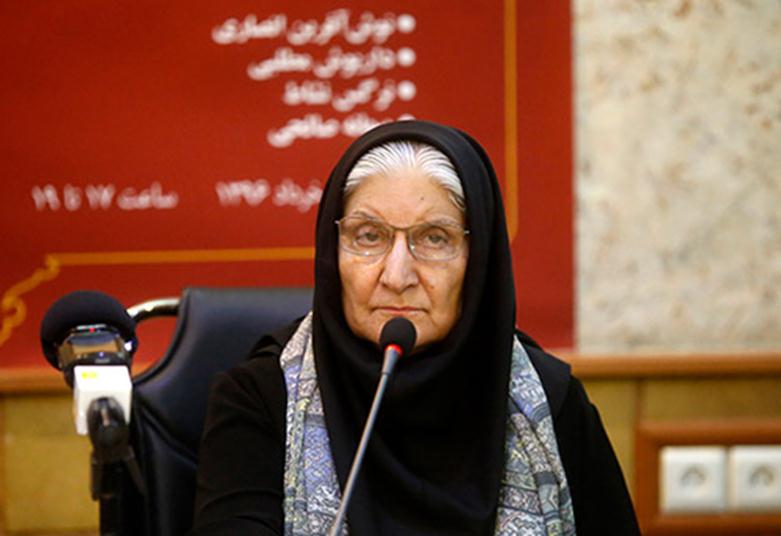
She added, "oral history interviews are very useful works and in fact are a review of scientific life of a person that sometimes are very informative. I hope that friends introduce these books to their students in classrooms. Today we have the problem that forget great builders of our field very soon, and of-course if a field moves without history, it will never grow, because it will directed this side and that side due to political winds and eventually it will disappear. It has happened many times that some people have met me and said that they are very happy because of visiting me, as I'm an important figure! I'm not happy from the word at all, because being an important figure has not a beautiful meaning, and if instead of the term they told I'm root, I would be happy more. We must now recognize that who have been architects of current library and information thought in our country. In this architecture, such as these books (Pearl of Knowledge) play an important role. At the other hand, because the questions are the same, they could be asked from members of librarian association and finally compare answers in order to reach a general conclusion that means what happens in a period that a group thinks in this way. Title of the book is also selected very well."
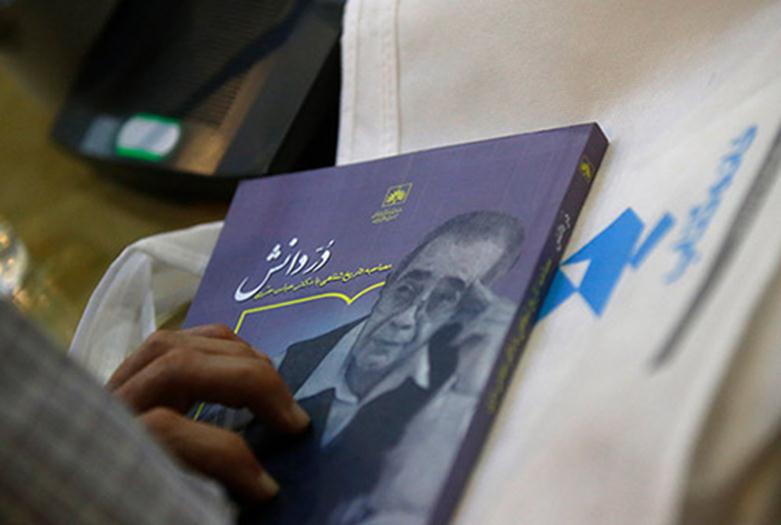
Nooshafarin Ansari pointed out a few other points: "papers of doctor Horri which had been published in another book called" About" should be noted in this book. Part of "About" is very important because it determines what society have thought and written about the person. Changes that he created is another noteworthy point. Theses of the department were all bibliography until when doctor Horri said let's create a change. After that he no longer considered bibliography as thesis research and a way was opened for new students and ideas.
Another point that has a fundamental role was research seminar issue. We know that some friends, even after getting a PhD, do not know research and in fact aren't a questioner not and it was a great chance for students Library of Tehran University and elsewhere that doctor Horri was their teacher because in a course that that was supposed to be an introduction for a good thesis, he taught students worldview and this issue was extremely important and valuable.
Another case is that in all the 17 or 18 years that I was department head, we had a kind of participatory management. This means that none of us actually was head. We had a formal head and sign owner, but we cooperated in thought. What that had strengthened power of the group was that everything was consulted and maybe reason of the cooperation and consultant was our permanent presence in the department. We weren't adjunct professors, we were always present and our plan was clear. For example, we knew that at some date we would have a session and we should gather and talk about issues of the department.
One of issues that could be more discussed is forum discussion. The moment that we decided that I should undertake training, doctor Horri said that he would support me and I told him he should write text. We owe him for writing the first reference book and the first introducer book of library science, because he had a tightly coherent and regulated mind and was really able to do that. The two books empowered us to continue library courses with text. In this book, the questioner didn't ask him whether he cooperated with non-governmental organizations or not? Because if the questioner raised it, possibly doctor Horri would talk another discussion and say about his presence in Encyclopedia of Children and Adolescence and also Children's Book Council. From 1353 that he was a member of the Council, where they asked about his history and that in which institutions he is member, he referred Children's Book Council. Where critical positions he supported the council and, in fact, he was its savior.
Texts of oral history are short texts and are edited in many cases. It is possible that someone who is not familiar with the interviewee, read the text without information and pass it, but for me who I'm familiar with him, I know that in certain parts of his speech surely he told a joke or somehow humor that its empty place is felt in the book. I think it is the way that the National Library has accepted and all these oral histories to be released in the same way."
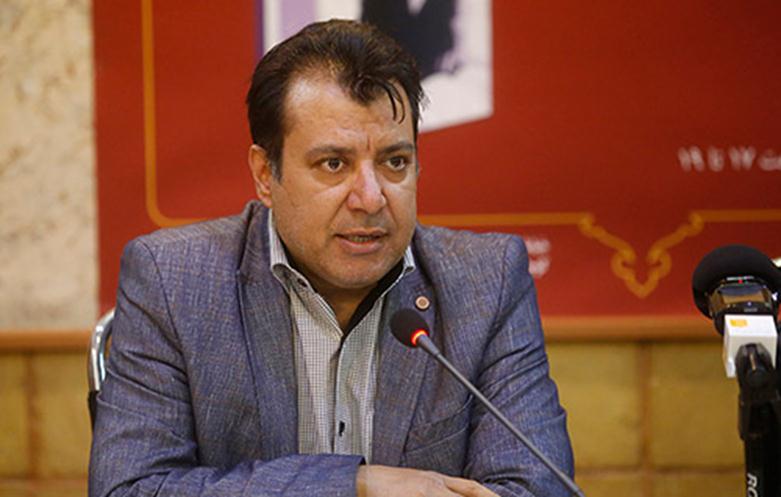
Dariush Matlabi continued the discussion, "Ms. Ansari noted sense of humor of the master with special elegance and perceptivity. I remember he didn't participate in any meeting without some humor, of-course a pleasant one, and at the other hand his humor didn't miff anyone. Another point is that National Library must be more careful about the issue that the book shouldn't be like other textbook and scientific books and when it is read, its speech style to be preserved."
Archival direction was reason of doing the interviews
Peimaneh Salehi was next lecturer of Book Review of "Pearl of Knowledge: Oral History Interview with Ph.D. Abbas Horri" was. He began: "I am expert in charge of Oral History Department of National Library and Archives Organization of Iran. I have worked for about 25 years in the organization and it is about three or four years, I have done oral history work. I have interviewed with many people in field of library and information science as well as Persian language and literature. First, I want to talk a little about method of oral history which is not unpleasant for librarian friends.
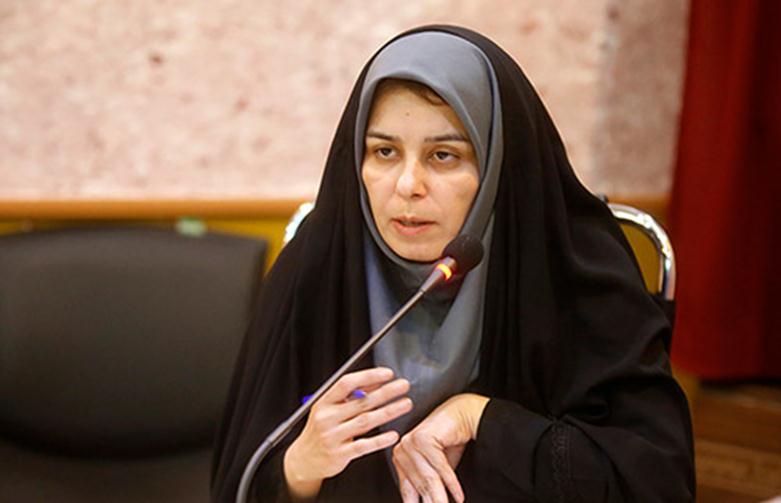
Oral history is a way of research and scientific method of historical research based on purposeful and active interviews for collecting historical data and information based on a specific topic; for people who have been present in an event, whether they were influenced or influenced it, and instead of written data it focuses on memories and what people heard. Oral history because of its interdisciplinary position is used in all fields and disciplines and often historical problems are analyzed by the approach. In fact, it considers untold aspects of people lives and unwritten of written sources. It was studied after invention of cassette player at Columbia University in 1940s. Interviews of the period were mostly based on writing about elites. The Second period of Oral History is in 1960s that addresses workers, immigrants and women. The third period is era of archiving oral history archiving sources of oral histories and using them in periodicals was considered. Oral history journal was founded in the period, many books were written and oral history became academic and enters in colleges and universities. The fourth period is era of numbering oral history sources and in the fifth period oral history gained its place as an interdisciplinary field and different sciences applied it in terms of their need.
Production of oral history in Iran is referred to after the Islamic Revolution, when in 1981, Harvard University carried out Oral History Project by Ph.D. Habib Lajvardi. He did the project with 132 former officials of Iran in 800 hours of interviews that its books have also been published. As well as management of Iranian Studies at Columbia University raised Oral History Project of Iran left groups. Research Association for Iranian Oral History (RAIOH) and Center for Iranian Jewish Oral History (CIJOH) were also of active centers of oral history in field of subject related to Iran contemporary oral history which addressed oral history in abroad. Inside Iran, institutions such as Islamic Propaganda Organization's Hozeh Honari, Islamic Revolution Documents Center, Institution for Iranian Contemporary Historical Studies (IICHS), Astan Quds Razavi, Martyr Foundation of Islamic Revolution, the Center for Preserving Relics and Publishing Values of Sacred Defense, NLAI and Iran's National Archives Organization were engaged in field of oral history. Activities of all of the centers were done paralleled, and their interview and editing techniques are different.
Oral history past of NLAI refers to 1992. Oral Archive Department was formed in Management of Archives Services of Iran's National Archives Organization. In fact, it was included in statute of the organization that oral history to be established, but it was not considered until 1992 when the bureau is founded. From then numerous interviews have done with contemporary political, scientific, cultural and artistic figures in order to complete the unwritten of written sources. Name of this group is now information group of audiovisual sources that today continues to work under the research Institute of documents. More than 2,500 hours of audio and video interviews have been conducted that more than 90 percent of the interviews have been implemented after recording and listing. Since 2014, bibliography of all of listed interviews has been loaded on National Library website. Interviews that there is no publication limitation for their owners, their full text are available in NLI's Digital Library. Bibliography Information of all of our interviews is available too. Researchers can visit Hall of Information and taking notes from interviews. Most of our interviews took place in 1380s (SH), but it hasn't been policy of the organization that oral history interviews to be published. Our goal has not been publication, but our interviews have been archive-oriented and it hasn't been like Islamic Revolution Documents Center that to print interviews quickly. Fortunately, it is three years we took license for publishing a number of these books. The reason for this delay wasn't lack of preparation of interviews, but policy of the organization was that they would not be printed.
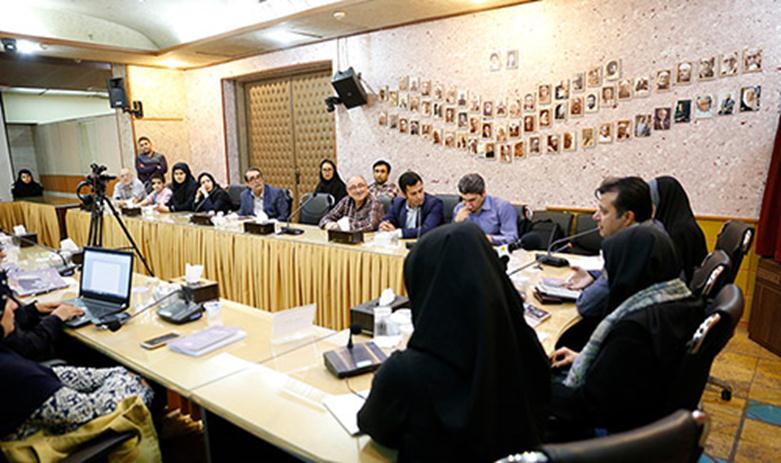
For doing interviews we were at first five or six people who each of us focused on one or two issues. In fact, we focused on history of the issue, for example I did an interview in field of library and Persian literature. Before conducting interviews we did much research and we analyze all of activities that a narrator had been done and asked question and did the interview fully knowledgeable. It is also valuable to thanks Ph.D. Mrs. Neshat that the organization council vested responsibility of judgment, analysis and final opinion of the book in her. She reminded me important points that all of the note were considered and revised.
Interview with sir Horri was done in 2004. That was why a few colleagues and I developed a project called "oral history project of NLAI". The plan addressed interview with deputies, managers, consultants, influential, active and prominent people in Iran's National Archives Organization and NLI and institutions that the organization was created through joining them, such as Center for Library Services at NLI. We completely considered history of NLI and Iran National Archives Organization and then chose our interviewees. Interview with Mr. Horri was also based on the same plan. Our interviews were subject-centered, not person-centered. Priority of our questions is based on project subject. I had designed questions, in details, about all fields that Mrs. Ansari and Mr. Matlabi stated, like book council and the Foundation for Iranian Studies that doctor Neshat had told. Doctor Horri was in NLI from 1991 to 2001 and due to his disagreement with NLI at the time, he decided not to cooperate with it. I called him in July 2004 for an interview and he invited me to talk. I went to Tehran University. Due to his short time, he declined the interview but wanted me questions and took my call number in order to if his idea for doing interview changed, he would contact us. Two months later he called me and told because our work is valuable he accept the interview and he also said that he had just time in Mehr (September and October). He set time of the sessions too. I interviewed him in four weeks, on Saturdays, for 6 hours and then he told me, "three months later call me, if would have time and ability, you would continue the interview and I would answer others questions." Three months later twice I met him and called twice, but unfortunately the opportunity didn't happen to complete the interview. I didn't neglect, because my questions were really perfect, but the opportunity did not happen so that the doctor to answer them all."
Oral history interview; advantages and limitations
Narges Neshat was next lecturer who continued the session. She said, "Our discussion is on the book" Pearl of Knowledge: Oral History Interview with Ph.D. Abbas Horri". I think the same title has two fundamental faces. First, doctor Horri is leading Professor of new Information Science and knowledgology and traditional LIS. He lived about 76 years and spent more than half a century of the glorious life in service of teaching the field. The master was a large-hearted and old man who had a dynamic and young mind, and constantly migrated from this scientific branch to that branch and during these scientific migration other friends and I used as much as it was possible and our ability, and really he deserves pearl of knowledge.
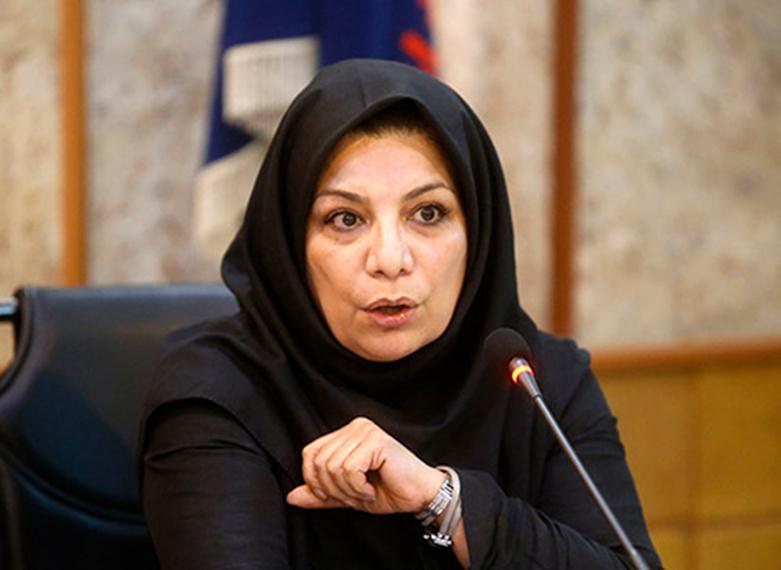
Another face of this title (Oral History Interview with Ph.D. Abbas Horri) is oral history. All friends know that oral history, as a research work, to record events from view of observers of a stream so that future generations to know how has been a stream, a school or a teaching and which way it has passed, but as every event may have advantages and limitations, an oral history interview has naturally advantages and limitations too. One of the limitations that I point out is vision and attitude of interviewer and interviewee, that advance the interview and matters that they want to ask and answer them, and it is very important. Another point that Mrs. Salehi also referred it is that often interviewees are leading figures of that field and have passed diverse experiences and naturally they are old that the issue has risks and it is possible to be forgotten many things during the time and it its normal. Another effective issue is that mind is dynamic and active and constantly reforms itself, so many events to be reversed and changed during time because of people environment. In fact, it happens consciously or unconsciously. Another risk is that it may be some people, deliberately or without goodwill, present events in other way, in this case, according to Ms. Ansari, one could understand origin story through putting descriptions of different people together. Fortunately, none of these issues happened for the book.
When the interview was conducted with doctor Horri in 2004, topics were very new and fresh and it was a short time that they had been happened. This is a positive point. Another point is that after 2004, other events have occurred that have influenced much upon our field, but they have been neglected, such as renaming the field, Faculty of Library and effects of the master on it, Council of Promotion Higher Education and effects of the professor in changing name of credits, Academy of Persian Language and Literature and his impact on term selecting department, Children's Book Council and his impact on Encyclopedia, his activity in Foundation for Iran Studies and other his measures that may the friends to note them where it will be needed. These events may would happen after the interview and I wish they will be recorded too, but I'm not worry very much about it, because professor Horri with his tact, as a historiographer, recorded them in different places and much of book chapters derived from the same historiographies that has been recorded in different places.
There are precipitations about compiling the book that I don't think Ms. Salehi is blamable for them and an observer in council of NL's publication must interfere in printing, publishing and compiling the works and has more scholarly view about the works. I feel that if doctor Horri was alive, he would never accept this way of development and compilation. If, for example, I point out setting chapters and naming chapters, it is noted in the ninth chapter to "Participate in International Forums and Analyzing Activities of Cultural Research Bureau." The two issues are entirely different things that I do not know reason of being them alongside. Or in Chapter X, "Publication of Field of Library and Information Science and Library and Information Association" that in which doctor Horri's approach on the association is a separate issue, and the publication also has a distinct story. The two do not match. Or Chapter VIII, "Writings and Cooperation with Periodicals" are again two very different things that putting them together caused different issues. Or it is addressed public and academic libraries and library labor market in Chapter VI and there is no link between labor market and public and academic libraries. It is also written following title of chapter X "Publishing Works in Field of Library Science", in which, at first, audiences think that they are works of professor Horri, while it is evaluation of Doctor on the published works of the field. Another point is issue of punctuation and homogenization content and statements; such as efficiency of conventions and seminars and attending in international conferences, convention is the same conference, and conference is the same seminar."
She added: more than a names or places index, we need a good subject index in order to connect us to that mainstream or cases that are question of the discipline and its practitioners. Mrs. Salehi provided postscripts in the book that were very time-consuming and she worked hard. She deserves to be gratitude for them, but in some cases it could be said that the endnotes replace the main topics, because most of them are long and it was better that some of them were used as footnote in order to connect the reader with topics. Finally, I hope that these points will open a door to reform next works. "
Macro approach in different fields of science
Dariush Matlabi continued the meeting, "I was one of those who interviewed with doctor Horri many times. We implemented them and they were published in monthly journal of Ketab-e Mah Koliat or other Journals. When I was implementing the interviews, I would say that their editorial work is very easy, because the professor spoke very fluent and I can tell you that most of times his speeches didn't need any editing and it was because of that he really was a teacher. He had taught in all education levels, from primary to Ph.D, and because of his extensive studies in various fields, in his classes, such as class of indexing, in addition to teaching professional topics, he presented also topics that weren't directly related to library but opened a door for us. Another point that I felt its empty place during reading the book was that always when professor Horri presented some notes, it was sign of his macro approach in different fields of sciences, and I felt there is no trace of his macro ideas in the book.
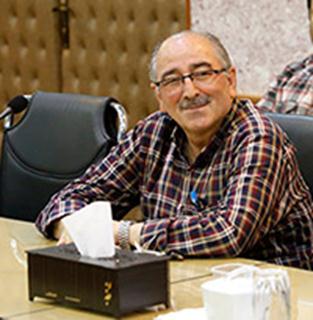
Kazem Hafezian was next speaker of Book Review meeting of "Pearl of Knowledge: Oral History Interview with Ph.D. Abbas Horri". He said: "once they called me from radio organization and I was invited to an interview with doctor Horri. I asked why me. They replied that doctor Horri had wanted. It was a great honor for me that I gladly accepted and did the interview. After the interview was broadcast twice on the radio, I decided to publish it and I did it. After printing, I sent one for the doctor and he wrote needed points and I saved the notes for myself as a souvenir. However, I was among those who enjoyed the doctor humor. Another point is that border of politeness in personality, speech and behavior of the doctor was very impressive. Appropriate name of the book is another point that I should note and finally through publishing 10 to 12 books in our field by Ms. Salehi, I must thank her that in a way write history of our discipline by interview with famous people.
Seyyed Ebrahim Omrani also said: "I want to say two things about Professor Horri. First in a day that his commemoration was held in Society for the Appreciation of Cultural Works and Dignitaries, many speeches were presented. "Doctor Horri as researcher", "Doctor Horri, children literature and the council", "Doctor Horri as teacher", etc. I met Doctor Mohaghegh and I told you didn't say a thing and that is "Doctor Horri as Mullah". I meant real meaning of the word. I was younger then, and malevolently I said things to test the professor. Sometimes there was so new point that I was sure the professor had not yet engaged it. I went and asked him. He first asked me four or five questions and then guided me, and the treat was indication of an analytical mind. That's why my title for the doctor was doctor Horri Mullah.
The second point about Mr. Horri, when in the beginning I read the book, I did not see it. One story is for pre-2004 and is another for post-2004. In 1989 Mrs. Ph.D. Ansari, as always, initiated a new measure that it was a course of Library for students of Qom Seminary. In this course, I was a young 31 or 32 years old, had the honor to teach alongside professors Horri and Ansari. After finishing the course, doctor and I saved our contact with Hawza until about 1376, I every week on Thursdays and doctor Horri every two weeks on Thursdays. Result of Mrs. Ansari and doctor Horri was the Islamic Sciences Thesaurus. The thesaurus wouldn't be provided without doctor Horri. He taught there indexing and monolingual thesauri and I worked with the friends the two credits practically. A story which is related to post 2004 was Commission for Information System of Science and Technology. We had a debate with minister and deputy of the minister in Organization of Scientific and Industrial Formation and issue of our discussion was that kitchen and physical education have a special position in Science Ministry and why the library doesn't have such a special position? Finally the debate was lead to Commission of Information System that doctor Horri, doctor Khosravi and I became natural persons of the commission. I had also there the honor to be colleague of the doctor for 5 or 6 years and the friends should not forget the issue."
Saeid Rezaie Sharifabadi also said: "My acquaintance with the doctor Horri is for 30 years ago; when we met him. When he spoke, we never felt his words repetitive and boring. Everywhere I have said that if there has been a little research spirit, it was result of his research seminar class and his view and analysis on problems.
The doctor wasn't just with our peers because lately if a BA student came and asked him to attend in a seminar, he would accept gladly and with the action learned others that they must consider young generation. Doctor Horri and I who participated in the last meetings of Information committee of Jihad Sazandegi (Construction) and Planning Committee of Ministry of Science and usually there were about 7 or 8 people in these meetings, the final comment of every discussion was the doctor idea. In fact, it could be said that his opinion was prevailing view, and this shows he was comprehensive.
In the late day the doctor was ill, but his sickness had not been serious. He wanted to go Canada for treating, but before that we had a meeting in Jihad Sazandegi that lasted from 9 to 12 a.m. After about three months they called and said please come to get money of that meeting. When I went there I should sign a receipt to get the money. When I looked at the amount of the receipt, I saw it was 270000 Rials! It is not for a long time ago, but for 2012. In that year, consultants were paid 3000000 to 4000000 Rials for an hour talking. When I, ashamedly, gave him the amount, he said, with his always laughing, didn't expect to receive the same mount and it showed his contentment. In every meeting that we were together, it was not possible that you didn't hear a humor and joke from him.
I say also a point about oral history and it is that I was for a while in the National Archives. An important part of the National Archives was oral history part of the organization. Our purpose in oral history was that what people have in their mind and it is part of the country history to be recorded in order to be used in the future. It took years that oral history of the organization published his first book and when it was published, it made us very happy, because the dam had been broken. Unlike doctor Neshat, I know these postscripts very effective in oral history. Mr. Hossein Dehbashi who is known in field of oral history, at his early research activities contracted with NIRT for interview with about 50 to 60 commanders and heads of the army and Pahlavi regime, but when they understood it was for NIRT, they refused the interview. Then he went to them with letter of National Achieve and said the interview was for recording in history and whenever you let, the interview would be published. After that, all 50 to 60 were satisfied to do the interview. Publishing the interviews with these individuals had been stopped because the published number interviews are lack of the notes and postscripts."
Oral history of part of Knowledge Management field
Ali Jalali Dizaji in the continuance of book review meeting of "Pearl of Knowledge: Oral History Interview with Ph.D. Abbas Horri" said, "This meeting is a book review. When we talk about critique two parts comes to mind, first book and second its author. It is very natural that all participants respect the teacher and talk about the author of the book, but I should say a few things on the book. First, the very new field that we should have the honor to it is field of Knowledge Management. Oral history is a part of knowledge management. It is a part that presents documentation of experiences in field of knowledge management and in fact the book is considered part of knowledge management.
I see notes as postscripts very valuable and there are some points that are less found in other books. As well as, the characteristic humor of him can be seen in the same work. Most of all politeness, civility and his very cordial relationship with his students can be stated."
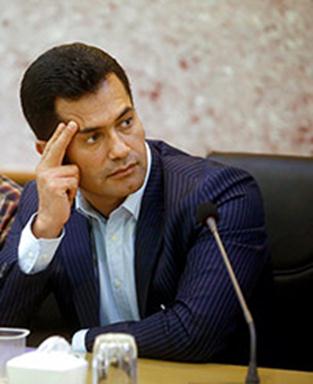
Alireza Norouzi also added, "I swore before his grave that I never neglect in teaching three credits of Research Seminar, Indexing and Research Method, that I was his student." Maryam Sarrafzadeh aslo said: "Professor Horri had an attractive pen which is less common in scientific writings. The reason for having such a pen and writing perhaps was that he read many books in childhood and of course voluminous books, and perhaps it is a lesson both for ourselves to study more and encourage students to do it too." Najmeh Salemi also continued:" Mr. Horri when wanted to define the field, said the library science is like dying and you won't be a librarian till you would die and when you die you cannot describe it.
My question to Ms. Salehi is this: those who have complex personalities like Professor Horri, is it sufficient interview of one person with him? Don't should during interview with such people to invite other several experts for providing a more complete interview? "
Nooshafarin Ansari said in this part: "all interviews must be just for one person in order to conclude a result from scientific personality and way of life of that person by aligning the mosaic." Peimaneh Salehi also ended the meeting with his words as "many of notes that Ms. Neshat said are related to organization publication. About speech structure, all efforts were made to preserve speech structure. At the other hand, our editing is at extent that helps only reading the text. Cases of pre 2004 consist all his activities that because of limited time of the professor weren't presented in the book, and about cases of post 2004, we cannot manipulate the interview text. On the other hand, oral history activity needs budget and enough time that it is not possible in public sector and perhaps if it was done in private sector, it would have been much stronger. There is no public and state facility for interview with several people but if the interviewee conditions that some people should be present, we will accept it surely and arrange an appointment. My colleagues and I have tried in the 25 years to open a window on contemporary Iran history. We had an archival view and looked at subjects as historian in order to record history of various fields and the way will be continued."

Number of Visits: 5530








The latest
- Exploring The Concept of Time, Place and Narrator in the Interview Process
- Memories of the wife of the martyr Seyyed Mohammad Ali Jahanara
- The 371st Night of Memories – 2
- Oral History News – August-September 2025
- Medal and Leave - 11
- The 371st Night of Memories – 1
- Language and Speech Style in Oral Narratives
- The Circumstances of His Martyrdom
Most visited
From Javanrud to Piranshahr
The Memoir of Reza MohammadiniaThe book From Javanrud to Piranshahr recounts the life and struggles of Commander Reza Mohammadinia, who spent part of the Iran–Iraq War in the western and northwestern regions of the country. During those years, he held responsibilities such as deputy commander of the Seventh Region of the Islamic Revolutionary Guard Corps (IRGC), acting head of the Javanrud district, service on the southern fronts, director of ...
Tactical and Strategic Analysis and Limitations
The present paper, entitled “A Critical and Scholarly Study of Dr. Hossein Alaei’s Two-Volume Book: Tactical and Strategic Analysis and Limitations”, is a research work that examines and evaluates the two-volume book “An Analytical History of the Iran-Iraq War”. In this study, the strengths and weaknesses of the work are analyzed from the perspectives of content critique, methodology, and sources.Clarifying the Current Situation; Perspectives of the Oral History Website
The definition of a “journalist” and the profession of “journalism” is not limited to simply “gathering,” “editing,” and “publishing breaking news.” Such an approach aligns more with the work done in news agencies and news websites. But now, after years of working in the field of books for various news agencies, newspapers, and magazines, when I look back, I realize that producing and compiling content for ...

